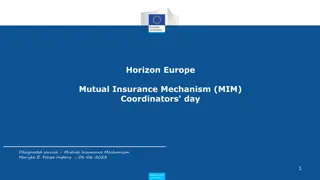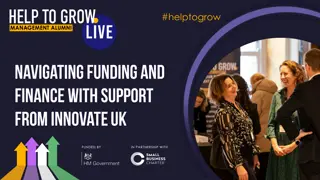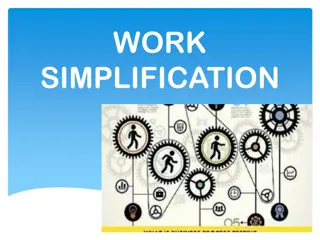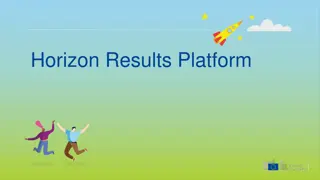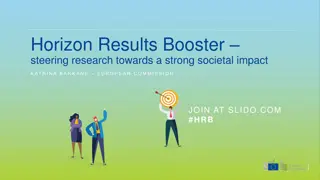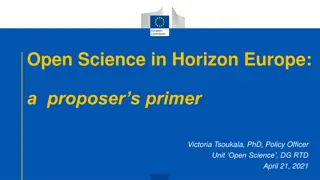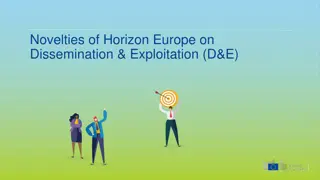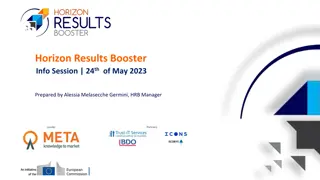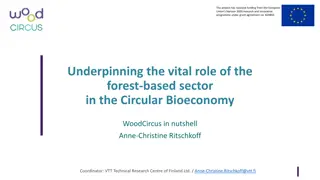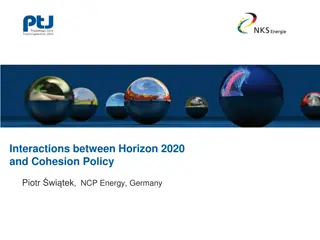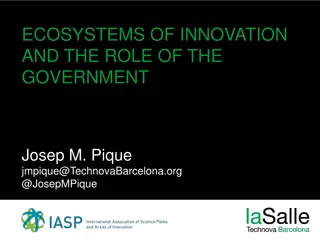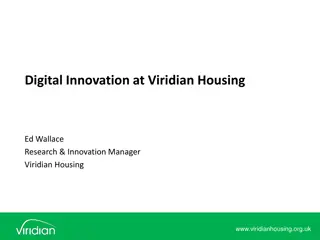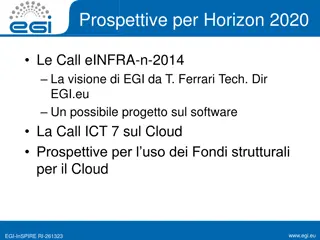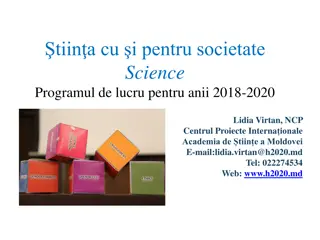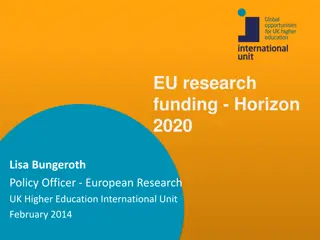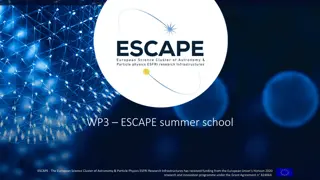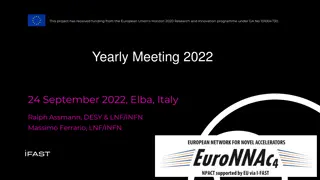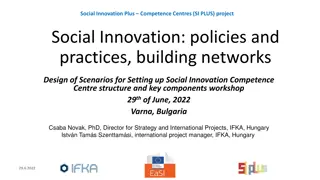
Horizon 2020: Impact and Simplification for Research and Innovation
Horizon 2020, with an 80 billion euro funding program, aims at economic growth, innovation, and societal impact. It focuses on improving R&D capabilities, creating high-tech jobs, enhancing competitiveness, and promoting sustainable growth. The program also emphasizes simplification in participation rules for quicker project implementation. Overall, Horizon 2020 strives to strengthen Europe's research, innovation, and technology landscape.
Download Presentation

Please find below an Image/Link to download the presentation.
The content on the website is provided AS IS for your information and personal use only. It may not be sold, licensed, or shared on other websites without obtaining consent from the author. If you encounter any issues during the download, it is possible that the publisher has removed the file from their server.
You are allowed to download the files provided on this website for personal or commercial use, subject to the condition that they are used lawfully. All files are the property of their respective owners.
The content on the website is provided AS IS for your information and personal use only. It may not be sold, licensed, or shared on other websites without obtaining consent from the author.
E N D
Presentation Transcript
, " 2020 : & 1 24 2014 Department of Biomedical Research Institute of Molecular Biology and Biotechnology Foundation for Research & Technology -Hellas (FORTH/IMBB-BR) & Laboratory of Biological Chemistry, Medical School University of Ioannina IMBB-BR U. IOANNINA
What is Horizon 2020 Commission proposal for a 80 billion euro research and innovation funding programme (2014-2020) A core part of Europe 2020, Innovation Union & European Research Area: Responding to the economic crisis to invest in future jobs and growth Addressing people s concerns about their livelihoods, safety and environment Strengthening the EU s global position in research, innovation and technology IMBB-BR U. IOANNINA
Impact of Horizon 2020 for R&I Societal Impact and Contribution to Europe 2020 Key Features of projects ECONOMIC GROWTH 1 invested produces 10 extra GDP per annum Excellence Research and innovation outputs of Horizon 2020 Improved R&D capabilities Scientific publications New tools and techniques Models and simulations Prototypes, demonstrators, pilots Patents New products, processes, services Spin-offs pan-European competition MORE HIGH-TECH JOBS >800,000 in the medium term collaborative projects with critical mass Horizon 2020 COMPETITIVENESS Exports increase by 1,4% and imports decrease by 0,2% in the medium term not achievable without EU support leveraging additional private & public resources INCLUSIVE & SUSTAINABLE GROWTH Better health & more well- being A more secure society Sustainable agriculture Clean & efficient energy Smart, green, integrated transport Reduced greenhouse gas emissions Efficient use of natural resources support from idea to market Easy access for all participants including SMEs IMBB-BR U. IOANNINA
Simplification Single set of simpler and more coherent participation rules New balance between trust and control Moving from several funding rates for different beneficiaries and activities to just two Replacing the four methods to calculate overhead or indirect costs with a single flat rate Major simplification under the forthcoming financial regulation Successful applicants to get working more quickly: reduction of average time to grant by 100 days (current average of around 350 days under FP7) IMBB-BR U. IOANNINA
Three Priorities III I II Societal Challenges Excellent Science Industrial Leadership 1. Health, demographic change and wellbeing 2. Food security, sustainable agriculture and inland water research and the bioeconomy 3. Secure, clean and efficient energy 4. Smart, green and integrated transport 5. Climate action, resourse efficiency and raw materials 6. Europe in a changing world- inclusive, innovative and reflective societies 7. Secure societies-protecting freedom and securty of Europe and its citizens 1.European Research Council (ERC) 1.Leadership in enabling and industrial technologies 1.1 ICT 1.2 Nanotechnologies 1.3 Advanced materials 1.4 Biotechnology 1.5 Manufacturing and processes 1.6 Space 2. Future and Emerging Technologies (FET) 3. Marie Sklodowska-Curie (MSCA)-actions 4. Research infrastructures 2.Access to risk finance 3.Innovation in SMEs Joint Research Centre (JRC); EIT (European Institute of Technology) IMBB-BR U. IOANNINA
Priority 1. Excellent science Why: World class science is the foundation of tomorrow s technologies, jobs and wellbeing Europe needs to develop, attract and retain research talent Researchers need access to the best infrastructures IMBB-BR U. IOANNINA
European Research Council grant schemes Starting Grants Consolidator Grants Advanced Grants starters track-record of significant research achievements in the last 10 years Consolidators (7-12 years after PhD) (2-7 years after PhD) up to 2.0 Mio for 5 years up to 2.75 Mio for 5 years up to 3.5 Mio for 5 years Synergy Grants Proof-of-Concept bridging gap between research - earliest stage of marketable innovation up to 150,000 for ERC grant holders 2 4 Principal Investigators up to 15.0 Mio for 6 years IMBB-BR U. IOANNINA
MSCA - scope of activities International and interdisciplinary consortia for doctoral and early-stage training European Training Networks, European Industrial Doctorates, European Joint Doctorates Innovative Training Networks ITN Grants for post-doctoral researchers undertaking international and inter-sector mobility Dedicated support for career restart and reintegration of researchers European Fellowships and Global Fellowships Individual Fellowships IF International and inter-sector cooperation and transfer of knowledge through the exchange of staff Research and Innovation Staff Exchange RISE COFUNDCo-funding of regional, national and international programmes: doctoral programmes fellowship programmes Co-funding of programmes European Researchers' Night (NIGHT) NCP support Non call-based activities (studies and support to Alumni) Policy support actions NIGHT NCP IMBB-BR U. IOANNINA
Priority 2. Industrial leadership II Why: Industrial Leadership Strategic investments in key technologies (e.g. advanced manufacturing, micro-electronics) underpin innovation across existing and emerging sectors 1.Leadership in enabling and industrial technologies 1.1 ICT 1.2 Nanotechnologies 1.3 Advanced materials 1.4 Biotechnology 1.5 Manufacturing and processes 1.6 Space Europe needs to attract more private investment in research and innovation Europe needs more innovative SMEs to create growth and jobs 2.Access to risk finance 3.Innovation in SMEs IMBB-BR U. IOANNINA
SME instrument 10-15% success 50% success 10% of budget 6 months 90% of budget 12-24 months Approx. 2% of budget Coaching Demonstration Market Replication R&D Concept & Feasibility Assessment Commercialisation SME window EU financial facilities Quality label for successful projects, access to risk finance, indirect support Demonstration, prototyping, testing , market replication, scaling up, miniaturisation, research Idea to concept, risk assessment, technological & commercial feasibility IDEA continued support throughout the project MARKET IMBB-BR U. IOANNINA
SME support: integrated approach 20 % Collaborative projects SME instrument budgetary target in LEITs & SC 13% 7% Eurostars II Enhancing Innovation Capacity Market-driven Innovation 'Innovation in SMEs' Access to Risk Finance IMBB-BR U. IOANNINA
Next calls IMBB-BR U. IOANNINA
Priority 3. Societal challenges III Why: Societal Challenges Concerns of citizens and society/EU policy objectives (climate, environment, energy, transport etc) cannot be achieved without innovation 1. HEALTH, DEMOGRAPHIC CHANGE AND WELLBEING 2. Food security, sustainable agriculture and inland water research and the bioeconomy 3. Secure, clean and efficient energy 4. Smart, green and integrated transport 5. Climate action, resourse efficiency and raw materials 6. Europe in a changing world- inclusive, innovative and reflective societies 7. Secure societies-protecting freedom and securty of Europe and its citizens Breakthrough solutions come from multi-disciplinary collaborations, including social sciences & humanities Promising solutions need to be tested, demonstrated and scaled up IMBB-BR U. IOANNINA
Health, demographic change and wellbeing challenge Less prescription what to do, but not how to do it Strengthening competitiveness of EU industries - development of new market opportunities Multidisciplinary approach - fostering cooperation between academic and industrial sectors Also implemented by the Innovative Medicines Initiative (IMI) 2; European & Developing Countries Clinical Trials Partnership (EDCTP); Ambient Assisted Living (AAL) 2 IMBB-BR U. IOANNINA
Work programme Work programmes with a 2 year-duration! 15 topics in the co-ordination activities call (7 ERA-NET) 36 topics in the personalising health and care focus area call Objectives: Create opportunities for real breakthrough research Translation of findings into the clinic Reduce health inequalities Promote active and healthy ageing IMBB-BR U. IOANNINA
Personalising health and care 1. Understanding health, ageing and disease 3 topics 2. Effective health promotion, disease prevention, preparedness and screening 6 topics 3. Improving diagnosis 3 topics 4. Innovative treatments and technologies 6 topics 5. Advancing active and healthy ageing 4 topics 6. Integrated, sustainable, citizen-centred care 8 topics 7. Improving health information, data exploitation and providing an evidence base for health policies and regulation 6 topics IMBB-BR U. IOANNINA
BioMedical informatics in H2020 (I) Societal challenge Challenge 1: Health, demographic change and wellbeing (I) Using in-silico medicine for improving disease management and prediction. Computer simulation using patient data Transferring knowledge to clinical practice and scalable innovation actions. Transferring BMI knowledge to application Better use of health data Data processing, KM, modelling and visualisation IMBB-BR U. IOANNINA
BioMedical Informatics within H2020 (II) Societal challenge Challenge 1: Health, demographic change and wellbeing (II) Individual empowerment for self-management of health Personalised health technologies and services Active aging, independent and assisted living User friendly solutions for ageing population Promoting integrated care Innovative solutions supporting the management of chronic disease Optimising the healthcare systems Disseminating innovative technologies and approaches IMBB-BR U. IOANNINA
& IMBB-BR U. IOANNINA
iPS IMBB-BR U. IOANNINA
BioMedical Informatics in H2020 (III) Excellence in Science base Link with relevant flagship (s) if any (ITFoM?) Bottom-up research activities Industrial competitiveness Link and use the generic ICT technologies IMBB-BR U. IOANNINA

